Erosion of values in our universities

University teachers used to be held in high regard by everyone in our society even just a few decades ago. Bangabandhu Sheikh Mujibur Rahman considered university teachers to be the conscience of the nation. However, university teaching as a profession has been losing its glory by the day. One could, of course, dispute my assertion. Having stayed in the profession for 25 years, I can say that the public no longer treats university teachers with the same level of respect that they did 20 years ago. The problem now is understanding why teachers at universities are becoming less respected. Do any of them display signs of moral decline? If yes, why did it occur?
Many faculty members at higher educational institutions around Bangladesh have lost their moral compass. Regarding the decline of moral standards in the academic world, academic dishonesty ranks high among the most pressing problems. Numerous teachers at different universities have persisted in engaging in unethical practices like plagiarism, fabrication of research findings, and discrimination based on favouritism. Through the media, we become aware of such developments every now and then. These actions undermine academic honesty and lower standards in the classroom. It's promising that universities nationwide have begun acting against these dishonest educators.
Another issue is the exploitation of power dynamics. Some of Bangladesh's faculty members use their positions of power to discriminate against students or fellow faculty members based on gender, ethnicity, religion or political ideology. This kind of conduct is counterproductive to establishing a safe and welcoming learning environment for all students. Some faculty members' desire to wield power and maintain ties with the establishment make them ignore their primary role as teachers; they are on the lookout for opportunities to use their official status for their benefit. There are, of course, always exceptions.
Concerns have also been raised about some faculty members' perceived lack of professionalism in Bangladesh. Some educators are lackadaisical about their jobs, either because they don't show up to class, or because they don't spend enough time with their students, or because they don't interact with them positively and encouragingly. The trust that students and the general public place in the education system is impacted by this lack of professionalism.
There are additional contributors to the decline of moral values among Bangladeshi faculty members. These include a lack of accountability, a culture of impunity, and inadequate training and support. It has been argued that a decline in ethical values is also caused by broader social and economic factors, such as poverty, inequality, and political instability, which impact some university faculty members.
Reforms at the institutional level are necessary to address the deterioration of ethical standards among faculty members. This includes bolstering accountability and transparency systems and encouraging a culture of professionalism and integrity among faculty and students at all levels of education. Broader social and economic reforms that prioritise social justice, equality, and good governance can also increase teachers' and the general public's confidence in universities.
University faculty members' declining moral standards threaten the credibility and quality of higher education. University administration, policymakers, civil society organisations, and the general public must all work together to solve this problem. The academic system in Bangladesh can contribute to the country's social and economic development and uphold the highest ethical standards if a culture of professionalism, accountability, and integrity is fostered within it.
The Bangladesh government has taken several steps to improve the standard of higher education in the country. For instance, the government has focused on revamping the University Grants Commission (UGC) so that it can better steer universities towards the goal of improving their quality. With support from the World Bank, the government launched the Higher Education Quality Enhancement Project in 2009, intending to enhance the quality of higher education in the country by investing in new facilities, better support for teachers, more research, and more effective pedagogy.
The Accreditation Council, now that it has been established, will evaluate universities' quality according to a set of criteria, such as academic standards, research capacity, faculty qualifications, and infrastructure. Recently, the government has increased funding for scientific and technological research. To foster innovation and research across disciplines, the Ministry of Science and Technology has established several research centres and institutes.
The government has actively sought opportunities for academic institutions to work with their counterparts in other countries. Universities worldwide have formed alliances with one another to share resources and facilitate academic and scientific collaboration.
Bangladesh's higher education system will significantly benefit from the government's efforts to improve university standards. These actions will lead to enhanced facilities, expanded research, better preparation of teachers, and revised curricula. However, there is a need to alter the way educators think. If this doesn't happen, these efforts won't improve universities. The government should focus on recruiting prominent scholars and educators in the highest positions who can promote openness and accountability on campus. No education reform will succeed in the long run unless we also work to increase teachers' professionalism.
Therefore, there is still much to do to guarantee that all universities in Bangladesh are apace with academic standards on a global scale. The nation's higher education system faces challenges that can only be overcome with continued collaboration between the government and universities. Furthermore, the government should think about lessening the impact of politics on academic institutions. University professors who dabble in politics not only lower their professional standing, but also impede progress towards better education for all citizens.
Dr Pranab Kumar Panday is a professor of public administration at the University of Rajshahi.

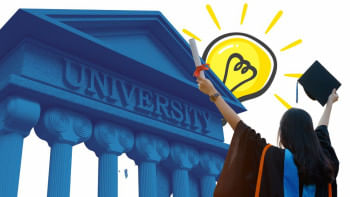
 For all latest news, follow The Daily Star's Google News channel.
For all latest news, follow The Daily Star's Google News channel. 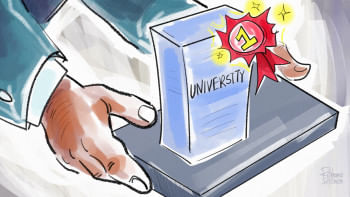
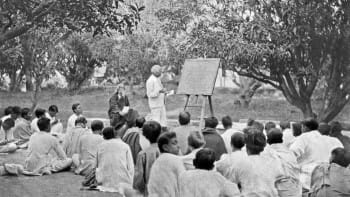





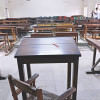
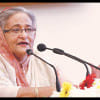




Comments